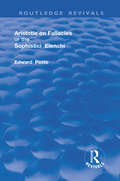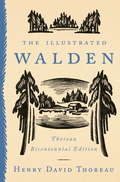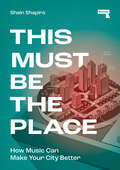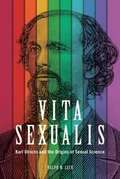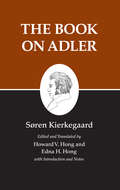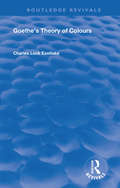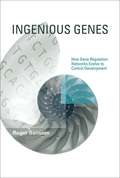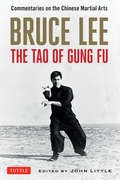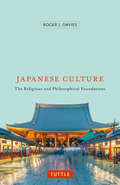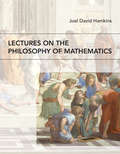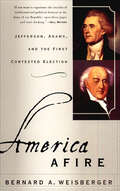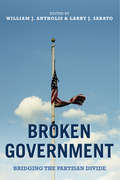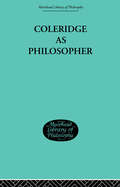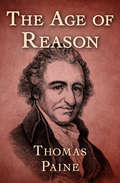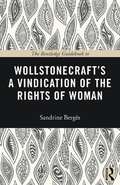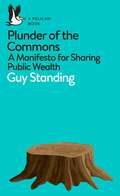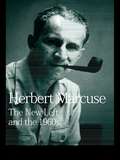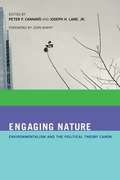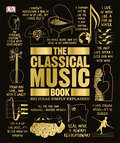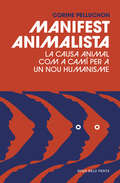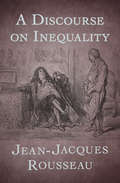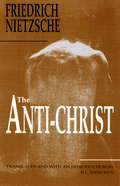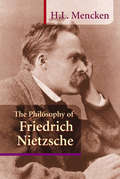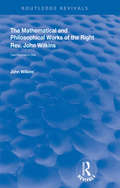- Table View
- List View
Aristotle on Fallacies; or The Sophistici Elenchi (Routledge Revivals)
by Edward PosteFirst published in 1866, Aristotle on fallacies; or the Sophistici Elenchi, Poste explains Aristotles explanation of the nature of fallacies, if not satisfactory, seems to be as compete and intelligible as any that has since been offered.
The Illustrated Walden: Thoreau Bicentennial Edition
by Henry David ThoreauTo coincide with the bicentennial of Thoreau's birth and TarcherPerigee's publication of Expect Great Things: The Life of Henry David Thoreau, here is a sumptuous rediscovery edition of the first illustrated volume of Thoreau's classic, as originally issued in 1897.In 1897, thirty-five years after Thoreau's death, Houghton Mifflin issued a two-volume "Holiday Edition" of Walden illustrated with thirty remarkable engravings, daguerreotypes, and period photographs. In 1902 the publisher collected the work into a single volume. Now, to mark the bicentennial of Thoreau's birth in 1817, this timeless landmark is reproduced with all of the original illustrations and the complete text of his mystical, practical, magisterial record of a life in the woods.From the Trade Paperback edition.
This Must Be the Place: How Music Can Make Your City Better
by Shain ShapiroThis Must Be the Place explores how music can make cities better.This Must Be the Place introduces and examines music&’s relationship to cities. Not the influence cities have on music, but the powerful impact music can have on how cities are developed, built, managed and governed.Told in an accessible way through personal stories from cities around the world — including London, Melbourne, Nashville, Austin and Zurich — This Must Be the Place takes a truly global perspective on the ways music is integral to everyday life but neglected in public policy.Arguing for the transformative role of artists and musicians in a post-pandemic world, This Must Be The Place not only examines the powerful impact music can have on our cities, but also serves as a how-to guide and toolkit for music-lovers, artists and activists everywhere to begin the process of reinventing the communities they live in.
Vita Sexualis: Karl Ulrichs and the Origins of Sexual Science
by Ralph M. LeckKarl Ulrichs's studies of sexual diversity galvanized the burgeoning field of sexual science in the nineteenth century. But in the years since, his groundbreaking activism has overshadowed his scholarly achievements. Ulrichs publicly defied Prussian law to agitate for gay equality and marriage, and founded the world's first organization dedicated to the legal and social emancipation of homosexuals. Ralph M. Leck returns Ulrichs to his place as the inventor of the science of sexual heterogeneity. Leck's analysis situates sexual science in a context that includes politics, aesthetics, the languages of science, and the ethics of gender. Although he was the greatest nineteenth-century scholar of sexual heterogeneity, Ulrichs retained certain traditional conjectures about gender. Leck recognizes these subtleties and employs the analytical concepts of modernist vita sexualis and traditional psychopathia sexualis to articulate philosophical and cultural differences among sexologists. Original and audacious, Vita Sexualis uses a bedrock figure's scientific and political innovations to open new insights into the history of sexual science, legal systems, and Western amatory codes.
Kierkegaard's Writings, XXII
by Søren Kierkegaard Edna H. Hong Howard V. HongAs a spiritual autobiography, Kierkegaard's The Point of View for My Work as an Author stands among such great works as Augustine's Confessions and Newman's Apologia pro Vita Sua. Yet Point of View is neither a confession nor a defense; it is an author's story of a lifetime of writing, his understanding of the maze of greatly varied works that make up his oeuvre. Upon the imminent publication of the second edition of Either/Or, Kierkegaard again intended to cease writing. Now was the time for a direct "report to history" on the authorship as a whole. In addition to Point of View, which was published posthumously, the present volume also contains On My Work as an Author, a contemporary substitute, and the companion piece Armed Neutrality.
Goethe’s Theory of Colours: Translated From The German, With Notes (Routledge Revivals)
by Johann Wolfgang GoetheFirst published in German in 1810, this detailed volume was translated from the German by Charles Lock Eastlake and, in six parts, examines every aspect of Goethe’s theory of colours, including psychological colours, chemical colours, the moral effect of colour, minerals, plants, insects, mammals and a multitude of further subjects.
Ingenious Genes
by Roger SansomEach of us is a collection of more than ten trillion cells, busy performing tasks crucial to our continued existence. Gene regulation networks, consisting of a subset of genes called transcription factors, control cellular activity, producing the right gene activities for the many situations that the multiplicity of cells in our bodies face. Genes working together make up a truly ingenious system. In this book, Roger Sansom investigates how gene regulation works and how such a refined but simple system evolved. Sansom describes in detail two frameworks for understanding gene regulation. The first, developed by the theoretical biologist Stuart Kauffman, holds that gene regulation networks are fundamentally systems that repeat patterns of gene expression. Sansom finds Kauffman's framework an inadequate explanation for how cells overcome the difficulty of development. Sansom proposes an alternative: the connectionist framework. Drawing on work from artificial intelligence and philosophy of mind, he argues that the key lies in how multiple transcription factors combine to regulate a single gene, acting in a way that is qualitatively consistent. This allows the expression of genes to be finely tuned to the variable microenvironments of cells. Because of the nature of both development and its evolution, we can gain insight into the developmental process when we identify gene regulation networks as the controllers of development. The ingenuity of genes is explained by how gene regulation networks evolve to control development.
Bruce Lee The Tao of Gung Fu: A Study in the Way of Chinese Martial Art
by Bruce Lee John LittleThis is a book that Bruce Lee began writing in 1964, but never completed. Lee's writing reveals his thoughtful analysis of the tapestry of Chinese martial arts, offering glimpses into the varied styles and his commentary on these arts. Lee's intense curiosity led him to accumulate this knowledge and expose the limitations of strict adherence to tradition, which inspired him to develop his cosmopolitan "way of no way."The Tao of Gung Fu includes insights into various Chinese martial arts and training methodologies, sketches of martial arts techniques, Lee's personal scrapbook of his famous thesis, "The Tao of Gung Fu." Witness Lee's personal cultivation of excellence in martial arts. His application of philosophy to physical movements epitomizes the unification of mind and body-a genuine way of living for the martial artist.Chapters include:What is Gung Fu?-An Introduction to Chinese Gung Fu, On Yin and Yang, and Bridging the Gap of Yin and YangSome Techniques of Gung Fu-The Fundamentals of Gung Fu, The Basic Striking Points of Gung Fu, Introducing the Wing Chun Straight Punch, and The Practice of FormsTaoism in the Chinese Art of Gung Fu-On Wu-Hsin (No-Mindedness), On Wu Wei (Nondoing), and Centered ThoughtsIdeas and Opinions-Traditions and Histories of Chinese Gung Fu, The Question of Psychic Center, and Bruce's view on Gung FuAppendices-Bruce Lee's gung fu background at the time he wrote this book, Gung Fu terminology, and Letters and gung fu scrapbook This Bruce Lee Book is part of Tuttle Publishing's Bruce Lee Library which also features:Bruce Lee's Striking ThoughtsBruce Lee: The Celebrated Life of the Golden DragonBruce Lee Artist of LifeBruce Lee: Letters of the DragonBruce Lee: The Art of Expressing the Human BodyBruce Lee Jeet Kune Do
Japanese Culture: The Religious and Philosophical Foundations
by Roger J. DaviesJapanese Culture: The Religious and Philosophical Foundations takes readers on a detailed and thoroughly researched journey through Japan's cultural history.This much-anticipated sequel to Roger Davies's best-selling The Japanese Mind provides a comprehensive overview of the religion and philosophy of Japan. This cultural history of Japan explains the diverse cultural traditions that underlie modern Japan and offers readers deep insights into Japanese manners and etiquette. Davies begins with an investigation of the origins of the Japanese, followed by an analysis of the most important approaches used by scholars to describe the essential elements of Japanese culture. From there, each chapter focuses on one of the formative elements: Shintoism, Buddhism, Taoism, Zen, Confucianism, and Western influences in the modern era.Davies concludes each chapter with extensive endnotes along with thought-provoking discussion activities, making this volume ideal for individual readers and for classroom instruction. Anyone interested in pursuing a deeper understanding of this complex and fascinating nation will find Davies's work an invaluable resource.
Lectures on the Philosophy of Mathematics
by Joel David HamkinsAn introduction to the philosophy of mathematics grounded in mathematics and motivated by mathematical inquiry and practice.In this book, Joel David Hamkins offers an introduction to the philosophy of mathematics that is grounded in mathematics and motivated by mathematical inquiry and practice. He treats philosophical issues as they arise organically in mathematics, discussing such topics as platonism, realism, logicism, structuralism, formalism, infinity, and intuitionism in mathematical contexts. He organizes the book by mathematical themes--numbers, rigor, geometry, proof, computability, incompleteness, and set theory--that give rise again and again to philosophical considerations.
America Afire: Jefferson, Adams, and the First Contested Election
by Bernard A. WeisbergerAmerica Afire is the powerful story of the election of 1800, arguably the most important election in America's history and certainly one of the most hotly disputed. Former allies Adams and Jefferson, president versus vice president, Federalist versus Republican, squared off in a vicious contest that resulted in broken friendships, scandals, riots, slander, and jailings in the fourth presidential election under the Constitution.
Broken Government: Bridging the Partisan Divide (Miller Center Studies on the Presidency)
by William J. Antholis Carolyn Dewar Tom Dohrmann Andrew Erdmann Gary W. Gallagher Ryan Harper Bruce J. Katz Kyle Kondik Kunal Modi Larry J. Sabato Alan TaylorIn an increasingly polarized political environment, the first year of the new president’s term will be especially challenging. With a fresh mandate, however, the first year also offers opportunities that may never come again. The First Year Project is a fascinating initiative by the Miller Center of the University of Virginia that brings together top scholars on the American presidency and experienced officials to explore the first twelve months of past administrations, and draw practical lessons from that history, as we inaugurate a new president in January 2017.This project is the basis for a new series of digital shorts published as Miller Center Studies on the Presidency. Presented as specially priced collections published exclusively in an ebook format, these timely examinations recognize the experiences of past presidents as an invaluable resource that can edify and instruct the incoming president.Contributors: Alan Taylor, University of Virginia * Gary Gallagher, University of Virginia * Bruce Katz, Brookings Institution * Kyle Kondik, UVA Center for Politics * Carolyn Dewar, Tom Dohrmann, Andrew Erdmann, Ryan Harper, and Junal Modi, McKinsey & Company
Coleridge as Philosopher (Muirhead Library Of Philosophy Ser.)
by Muirhead, John HFirst published in 2002. Routledge is an imprint of Taylor & Francis, an informa company.
The Age of Reason: Being An Investigation Of True And Fabulous Theology - Primary Source Edition
by Thomas PaineThe author of Rights of Man and Common Sense argues for belief in God without religion.My own mind is my own church. In The Age of Reason, political activist and Founding Father Thomas Paine makes a powerful case for a rational approach to theology. In keeping with the intellectual tradition of British Deism, Paine rejects the notion of divine revelation, saying “it is revelation to the first person only, and hearsay to every other.” He proceeds with a detailed analysis of the Bible’s inconsistencies and historical inaccuracies to conclude that it cannot be a divinely inspired text. Arguing against all forms of organized religion, he declares nature itself to be the only true testament to the existence of a divine creator. Originally published in three parts, in 1794, 1795, and 1807, The Age of Reason was a major influence on the freethinker movement in the United States. In Britain, however, it was declared seditious and led to the arrest of those who dared to print and distribute it. This ebook has been professionally proofread to ensure accuracy and readability on all devices.
The Routledge Guidebook to Wollstonecraft's A Vindication of the Rights of Woman (The Routledge Guides to the Great Books)
by Sandrine BergesMary Wollstonecraft was one of the greatest philosophers and writers of the Eighteenth century. During her brief career, she wrote novels, treatises, a travel narrative, a history of the French Revolution, a conduct book, and a children's book. Her most celebrated and widely-read work is A Vindication of the Rights of Woman. This Guidebook introduces: Wollstonecraft’s life and the background to A Vindication of the Rights of Woman The ideas and text of A Vindication of the Rights of Woman Wollstonecraft’s enduring influence in philosophy and our contemporary intellectual life It is ideal for anyone coming to Wollstonecraft’s classic text for the first time and anyone interested in the origins of feminist thought.
Plunder of the Commons: A Manifesto for Sharing Public Wealth (Pelican Books)
by Guy Standing'One of the most important books I've read in years' Brian EnoWe are losing the commons. Austerity and neoliberal policies have depleted our shared wealth; our national utilities have been sold off to foreign conglomerates, social housing is almost non-existent, our parks are cordoned off for private events and our national art galleries are sponsored by banks and oil companies. This plunder deprives us all of our common rights, recognized as far back as the Magna Carta and the Charter of the Forest of 1217, to share fairly and equitably in our public wealth.Guy Standing leads us through a new appraisal of the commons, stemming from the medieval concept of common land reserved in ancient law from marauding barons, to his modern reappraisal of the resources we all hold in common - a brilliant new synthesis that crystallises quite how much public wealth has been redirected to the 1% in recent decades through the state-approved exploitation of everything from our land to our state housing, health and benefit systems, to our justice system, schools, newspapers and even the air we breathe. Plunder of the Commons proposes a charter for a new form of commoning, of remembering, guarding and sharing that which belongs to us all, to slash inequality and soothe our current political instability.
The New Left and the 1960s: Collected Papers of Herbert Marcuse, Volume 3 (Herbert Marcuse: Collected Papers #3)
by Herbert MarcuseThe New Left and the 1960s is the third volume of Herbert Marcuse's collected papers. In 1964, Marcuse published a major study of advanced industrial society, One Dimensional Man, which was an important influence on the young radicals who formed the New Left. Marcuse embodied many of the defining political impulses of the New Left in his thought and politics - hence a younger generation of political activists looked up to him for theoretical and political guidance. The material collected in this volume provides a rich and deep grasp of the era and the role of Marcuse in the theoretical and political dramas of the day.This volume contains articles, letters, talks, and interviews including: "On the New Left," a transcription of the 1968 talk at the Guardian newspaper's twentieth anniversary; "Reflections on the French Revolution," which contains comments on the 1968 French student and worker uprising; "Liberation from the Affluent Society," which presents Marcuse's contribution to the 1967 Dialectics of Liberations conference; and "United States: Questions of Organization and the Revolutionary Subject," a conversation between Marcuse and the German writer Hans Magnus Enzenberger, published here in English for the first time.Edited by Douglas Kellner, this volume will be of interest to all those previously unfamiliar with Herbert Marcuse, generally acknowledged as a major figure in the intellectual and social mileux of the 1960s and 1970s, as well as to specialists, who will here have access to papers and articles collected in one volume for the first time.
Engaging Nature
by Peter F. Cannavò John Barry Joseph H. Lane Jr.Contemporary environmental political theory considers the implications of the environmental crisis for such political concepts as rights, citizenship, justice, democracy, the state, race, class, and gender. As the field has matured, scholars have begun to explore connections between Green Theory and such canonical political thinkers as Plato, Machiavelli, Locke, and Marx. The essays in this volume put important figures from the political theory canon in dialogue with current environmental political theory. It is the first comprehensive volume to bring the insights of Green Theory to bear in reinterpreting these canonical theorists.Individual essays cover such classical figures in Western thought as Aristotle, Hume, Rousseau, Mill, and Burke, but they also depart from the traditional canon to consider Mary Wollstonecraft, W. E. B. Du Bois, Hannah Arendt, and Confucius. Engaging and accessible, the essays also offer original and innovative interpretations that often challenge standard readings of these thinkers. In examining and explicating how these great thinkers of the past viewed the natural world and our relationship with nature, the essays also illuminate our current environmental predicament.Essays onPlato Aristotle Niccolò Machiavelli Thomas Hobbes John Locke David Hume Jean-Jacques Rousseau Edmund Burke Mary Wollstonecraft John Stuart Mill Karl Marx W. E. B. Du Bois Martin Heidegger Hannah Arendt Confucius ContributorsSheryl D. Breen, W. Scott Cameron, Peter F. Cannavò, Joel Jay Kassiola, Joseph H. Lane Jr. Timothy W. Luke, John M. Meyer, Özgüç Orhan, Barbara K. Seeber, Francisco Seijo, Kimberly K. Smith, Piers H. G. Stephens, Zev Trachtenberg, Andrew Valls, Harlan Wilson
The Cambridge Companion to Utilitarianism
by Ben Eggleston Dale E. MillerUtilitarianism, the approach to ethics based on the maximization of overall well-being, continues to have great traction in moral philosophy and political thought. This Companion offers a systematic exploration of its history, themes, and applications. First, it traces the origins and development of utilitarianism via the work of Jeremy Bentham, John Stuart Mill, Henry Sidgwick, and others. The volume then explores issues in the formulation of utilitarianism, including act versus rule utilitarianism, actual versus expected consequences, and objective versus subjective theories of well-being. Next, utilitarianism is positioned in relation to Kantianism and virtue ethics, and the possibility of conflict between utilitarianism and fairness is considered. Finally, the volume explores the modern relevance of utilitarianism by considering its practical implications for contemporary controversies such as military conflict and global warming. The volume will be an important resource for all those studying moral philosophy, political philosophy, political theory, and history of ideas.
The Classical Music Book: Big Ideas Simply Explained (DK Big Ideas)
by DKLearn about the world&’s greatest classical compositions and musical traditions in The Classical Music Book.Part of the fascinating Big Ideas series, this book tackles tricky topics and themes in a simple and easy to follow format. Learn about Classic Music in this overview guide to the subject, great for novices looking to find out more and experts wishing to refresh their knowledge alike! The Classical Music Book brings a fresh and vibrant take on the topic through eye-catching graphics and diagrams to immerse yourself in. This captivating book will broaden your understanding of Classical Music, with:- More than 90 pieces of world-famous music - Packed with facts, charts, timelines and graphs to help explain core concepts- A visual approach to big subjects with striking illustrations and graphics throughout- Easy to follow text makes topics accessible for people at any level of understandingThe Classical Music Book is a captivating introduction to music theory, crucial composers and the impact of seminal pieces, aimed at adults with an interest in the subject and students wanting to gain more of an overview. Here you&’ll discover more than 90 works by famous composers from the early period to the modern day, through exciting text and bold graphics.Your Classical Music Questions, Simply ExplainedFrom Mozart to Mendelssohn, this fresh new guide goes beyond your typical music books, offering a comprehensive overview to classical music history and biography. If you thought it was difficult to learn about music theory, The Classical Music Book presents key information in an easy to follow layout. Explore the main ideas underpinning the world&’s greatest compositions and musical traditions, and define their importance to the musical canon and into their wider social, cultural, and historical context.The Big Ideas SeriesWith millions of copies sold worldwide, The Classical Music Book is part of the award-winning Big Ideas series from DK. The series uses striking graphics along with engaging writing, making big topics easy to understand.
Manifest animalista: La causa animal com a camí per a un nou humanisme
by Corine PelluchonLa violència contra els animals és un atac directe a la nostra humanitat. Això demostra Corine Pelluchon en aquest breu, pragmàtic, i controvertit assaig que suposa una contribució radical a l'ètica i la filosofia política. Lluitar contra el maltractament animal és rebel·lar-se contra una societat basada en l'explotació, i per això la causa animalista és una qüestió política major que ens concerneix a tots, més enllà d'ideologies o conflictes d'interessos. Amb un estil viu, persuasiu i inspirador, l'autora proposa un camí possible i factible per portar aquest debat a l'esfera política amb tanta claredat i urgència com sigui possible. Ressenyes:«Corine Pelluchon ho explica tot absolutament bé en tot just un centenar de pàgines: per ser una alternativa vàlida, és imprescindible polititzar la causa animal.»Luce Lapin, Charlie Hebdo «L'objectiu principal de l'autora està completament assolit en aquest Manifest animalista: dóna al lector les claus que li permetran ampliar el radi d'acció de l'humanisme als animals.»Philippe Douroux, Libération «Una perspectiva bella i ambiciosa.»Isabelle Gravillon, Femme Majuscule «Un llibre d'intervenció política, tan compromès com lúcid.»Robert Jules, La Tribune «Una de les moltes i grans qualitats d'aquest Manifest animalista és que, en tot moment, el seu projecte està exposat de manera perfectament creïble i realitzable. Precisament per això, l'autora no es fa cap il·lusió sobre la dificultat que suposa introduir la qüestió animal en el debat polític.»Hicham-Stéphane Afeissa, Non Fiction
A Discourse on Inequality: A Discourse On The Origin Of Inequality, And A Discourse On Political Economy
by Jean-Jacques RousseauA fascinating examination of the relationship between civilization and inequality from one of history&’s greatest minds The first man to erect a fence around a piece of land and declare it his own founded civil society—and doomed mankind to millennia of war and famine. The dawn of modern civilization, argues Jean-Jacques Rousseau in this essential treatise on human nature, was also the beginning of inequality. One of the great thinkers of the Enlightenment, Rousseau based his work in compassion for his fellow man. The great crime of despotism, he believed, was the raising of the cruel above the weak. In this landmark text, he spells out the antidote for man&’s ills: a compassionate revolution to pull up the fences and restore the balance of mankind. This ebook has been professionally proofread to ensure accuracy and readability on all devices.
The Anti-Christ
by H. L. Mencken Friedrich NietzscheThis is Nietzsche's last book and a fitting capstone to his career. It's succinct, biting, and encapsulates the criticisms of Christianity found in his other works. This edition contains an 8,000-word introduction by its translator, the famous iconoclastic writer H. L. Mencken.
The Philosophy of Friedrich Nietzsche
by H. L. MenckenThe first book on Nietzsche ever to appear in English, this examination by legendary journalist H. L. Mencken is still one of the most enlightening. Mencken wrote this book while still in his 20s, but his penchant for thoroughness was evident even at that young age--in preparation for writing this book, he read Nietzsche's works in their entirety, mostly in the original German. A brief biographical sketch is followed by clear and thorough explanations of Nietzsche's basic concepts and attitudes. Analyzed are Nietzsche's much-misunderstood concept of the superman, his concept of eternal recurrence, his rejection of Christianity, and his basic rationalism and materialism. Included are two essays on Nietzsche that appeared in Mencken's magazine The Smart Set subsequent to the publishing of the original edition of this book. Nearly a century after its original publication, this remains one of the clearest, most concise, and entertaining introductions to Nietzsche to date.
The Mathematical and Philosophical Works of the Right Rev. John Wilkins (Routledge Revivals)
by John WilkinsOriginally published in 1708, this volume is an exact facsimile reproduction the 1802 edition of The Mathematical and Philosophical Works of the Right Rev. John Wilkins, and includes an index, added for the 1970 new impression. The book includes the works of Bishop John Wilkins, as well as a note on the life of the author; Bishop John Wilkins, as Warden of Wadham Colelge, Oxford and Master of Trinity College Cambridge, played a major role in the revitalization of British university education in the middle of the seventeenth century. Moreover, he was a prime mover in the establishment of the Royal Society of London and was its first secretary.
